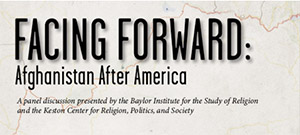Many Afghans hope for a better future, but those hopes have dimmed in the past month, a panel of experts told a Baylor University webinar audience.
 “Facing Forward: Afghanistan After America” was the theme of the online discussion, sponsored by the Baylor Institute for the Study of Religion and the Keston Center for Religion, Politics and Society.
“Facing Forward: Afghanistan After America” was the theme of the online discussion, sponsored by the Baylor Institute for the Study of Religion and the Keston Center for Religion, Politics and Society.
One panelist—Fawzia Koofi, a former member of Parliament in Kabul and former vice president of the National Assembly in Afghanistan—left Afghanistan only 24 hours before the webinar.
“My mind and heart and everything—including my family members—are still in Afghanistan,” Koofi said.
Aref Dostyar, consul general of Afghanistan to the Western United States, likewise emphasized the subject of Afghanistan’s future is neither remote nor abstract to those with ties there. He originally was scheduled to be in Kabul on Aug. 16—one day after the city fell.
“This is a very personal matter for all of us from Afghanistan,” Dostyar said. “Sometimes it’s difficult for us to get our heads around it, because it’s not just a piece of analysis. It’s not theory. It’s real life for us. Our friends are there. Our families are there. Our lives are there.”
‘Opportunities are shrinking’
Koofi observed “the opportunities are shrinking” for women and minorities to have any role in Afghanistan’s political structure.
During negotiations with the Taliban in the months prior to their seizure of power, she said, her baseline for conversations was making sure “the rights and liberties of individuals were respected.”
However, when former President Ashraf Ghani fled from Kabul, the Taliban filled the power vacuum with little opposition, Koofi noted. Now, the Taliban has little motivation to listen to voices calling for a more inclusive and representative government, she observed.
Sign up for our weekly edition and get all our headlines in your inbox on Thursdays
Koofi holds out little hope the Taliban acting on its own will allow women and minorities to hold strategic positions in government. However, international pressure could improve the situation, because the Taliban government “wants international recognition,” she said.
“There are countries and individuals working to give the Taliban the recognition they want, but in the meantime, we have to watch carefully their links to other militant extremist groups,” Koofi said.
Afghan women have ‘minimum expectations’
Koofi noted she faced some domestic criticism for being willing to negotiate with the Taliban to try to win concessions. Critics said the dialogue gave an appearance of legitimacy to a terrorist group, she said.
“It’s always easy to talk and exchange views with a group when you are same-minded. But with a group where there is a huge difference, to the extent that they are ready to kill another human being because of political differences, it’s not easy. But it’s important that we engage them,” she asserted.
Today, she said, women in Afghanistan have “minimum expectations” from the government—“expectations to be respected as a human being, to have the right to an education, to have the right to have a say in the future of the government—basic principles of democracy.”
‘The end of war is not the beginning of peace’
While the departure of U.S. troops from Afghanistan was the precipitating event that led to the Taliban’s abrupt rise to power, further military involvement will not solve the problems the nation faces, Dostyar asserted.
“There is no military solution to the problem in Afghanistan,” he said. “I think that seizure of power is not peace. When we say there is no military solution, that means even if you win a war, you may not be able to establish peace. The end of war is not the beginning of peace in our country.”
Dostyar urged his audience to recognize the “multi-faceted context” and complexity of Afghanistan’s multi-layered situation.
“There are definitely domestic elements to this, but to say it is just a civil war is over-simplifying the problem, the issue and the conflict in Afghanistan,” he said.
Currently, Afghanistan faces “enormous economic challenges” and “massive internal displacement” of about a half-million people, Dostyar observed.
‘The hard part is governing’
Ambassador Jonathan Addleton, former civilian representative to Southern Afghanistan and rector of Forman Christian College in Lahore, Pakistan, noted many Americans have forgotten the sacrifices and suffering of the Afghan people.
“For some reason, long wars tend to lead to short memories—even amnesia,” he said.
Addleton pointed out the Taliban has seized power, but it has yet to form a stable government.
“Winning wars, like winning elections, is the easy part. The hard part is governing. That still lies ahead,” he said.
Addleton urged an American webinar audience to recognize that the withdrawal of U.S. military does not mean the end of conflict.
“Conflict is not over just because somebody announces it,” he said.
‘This could have been avoided’
Similarly, Koofi commented, “I don’t think silencing the guns means peace.”
She insisted a conditional withdrawal of U.S. troops—rather than a “rushed” withdrawal to meet a deadline—could have provided time for negotiation and potentially prevented the collapse of the Afghan government.
“This could have been avoided,” she asserted.
Dostyar emphasized the need for global leadership at the international level. He urged Americans to recognize there still may be time to work toward a political settlement that offers a hopeful future for Afghanistan, since the Taliban has not fully formed a government yet.
“We should not give up on Afghanistan. It’s not over,” he said. “You have a partner in the Afghan people.”













We seek to connect God’s story and God’s people around the world. To learn more about God’s story, click here.
Send comments and feedback to Eric Black, our editor. For comments to be published, please specify “letter to the editor.” Maximum length for publication is 300 words.